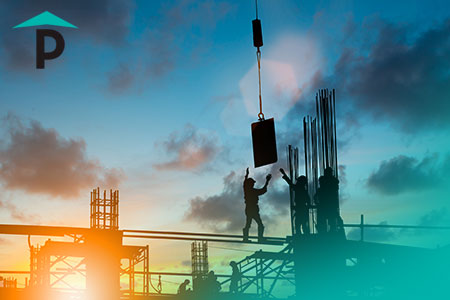In the construction industry, you can face tough competition when you’re trying to win work. You’re going up against other construction companies who could possibly bid lower than you and promise to get the job done faster than you too. Being able to beat the competition for at least some of the top jobs that you bid for is essential. You don’t need to win them all, but the more work you can get, the less you need to worry about generating profits or even just keeping your company afloat. There are lots of things that you can do to secure work contracts, and it’s not always bidding the lowest price or the fastest time that will help you win. Making sure you have financial protection is a huge plus point for many clients and even a necessity for some.
Call Now: (844) 612-7238
The Importance of Surety Bonds in Construction
 Surety bonds act as a type of insurance or guarantee when you take on construction work. They let your client know that if anything goes wrong and you are unable to complete the work or pay the right people, or perhaps a subcontractor lets you down, they won’t be left out of pocket. This is reassuring not just for them but for you too, because it means that your construction company won’t be responsible for picking up the pieces. You will have the surety bond to take care of unexpected expenses. You might think that there’s no need for it because you can keep costs low and avoid any mistakes, but you never know what could really happen.
Surety bonds act as a type of insurance or guarantee when you take on construction work. They let your client know that if anything goes wrong and you are unable to complete the work or pay the right people, or perhaps a subcontractor lets you down, they won’t be left out of pocket. This is reassuring not just for them but for you too, because it means that your construction company won’t be responsible for picking up the pieces. You will have the surety bond to take care of unexpected expenses. You might think that there’s no need for it because you can keep costs low and avoid any mistakes, but you never know what could really happen.
In many cases, the use of construction bonds are required. Public sector work, including federal government and state and local governments, requires your business to have a bond in place. This helps to protect taxpayer money and ensure that subcontractors and suppliers receive their payment. However, even when a surety bond isn’t a statutory requirement for construction companies, many private firms will still request the financial protection of a surety bond.
The Types of Construction Bonds
There are several different types of surety bonds that construction business owners should be aware of. Each of these bond types offers you protection in a different way and at different stages of the process of bidding for, securing and carrying out a job. The three primary types of contract bond are bid bonds, performance bonds and payment bonds.
Bid Bonds
 Bid bonds provide financial protection to the obligee if a bidder is awarded a contract but then doesn’t sign the contract or provide the required services. Project owners require this type of bond as a promise that the contractor will sign the contract once it has been awarded. It also serves as a promise that the contractor will take out performance and payment bonds as further reassurance that they will carry out the work and that the project owner is protected if anything goes wrong. A bid bond helps your business to secure more work by showing that you’re serious about what you are promising from the very beginning. Most public work projects require it, and many private projects do too. With Pinnacle, you can be sure of a 24-hour turnaround on pre-qualification and approval for bid bonds.
Bid bonds provide financial protection to the obligee if a bidder is awarded a contract but then doesn’t sign the contract or provide the required services. Project owners require this type of bond as a promise that the contractor will sign the contract once it has been awarded. It also serves as a promise that the contractor will take out performance and payment bonds as further reassurance that they will carry out the work and that the project owner is protected if anything goes wrong. A bid bond helps your business to secure more work by showing that you’re serious about what you are promising from the very beginning. Most public work projects require it, and many private projects do too. With Pinnacle, you can be sure of a 24-hour turnaround on pre-qualification and approval for bid bonds.
Performance Bonds
Performance bonds offer financial protection to the project owner if the contractor doesn’t carry out the services set out in the contract’s terms and conditions. Not only does it serve as reassurance that you will do the work to the best of your ability, but it’s also protection for your company. Even if you try to do what you promise every time, things can still go wrong, and you can’t predict the future. Construction projects are the most common type of project where a performance bond might be required, and they are usually needed for public work. The risk of carrying out the work is put in the hands of a surety company like Pinnacle so that it’s less worry for your business. Performance bonds might also be called maintenance bonds, contract bonds, supply bonds or warranty bonds.
Payment Bonds
Finally, payment bonds are used as an assurance that the contractor will pay subcontractors, suppliers, laborers and any other resources required for the project. Payment bonds are usually required together with a performance bond, which means that many projects will need all three types of bond. If a laborer, supplier or subcontractor provides materials or labor for your project and doesn’t receive payment, they would be able to make a claim against the payment bond, protecting the project owner before, during and after the project is carried out.
Getting a Surety Bond for Your Construction Company
 Since many construction projects require bid bonds, which often include the promise of a performance bond and payment bond, it’s vital to understand the importance of surety bonds for your construction business. Now that you know how they can help to protect you and your clients and help you to win work, you need to understand how to get the bonds you need.
Since many construction projects require bid bonds, which often include the promise of a performance bond and payment bond, it’s vital to understand the importance of surety bonds for your construction business. Now that you know how they can help to protect you and your clients and help you to win work, you need to understand how to get the bonds you need.
With Pinnacle, it’s easy to get what you need and start winning more work. Start by getting a quote, and you can be on your way to fast approval. If you’re located in California, you can get your bond by entering your license number on our Contractors License Bonds page to electronically file with the CSLB (California State Contractor’s License Board).
How Surety Bonds Win You More Work
Surety bonds help your company to win more work by helping you to meet the conditions that many project owners put in place. It’s a legal requirement for most public projects but, although private work is often left to the project owner’s discretion, it can often be required for private construction projects too. It shows that your company is trustworthy and willing to make sure that your client has the protection that they need before you enter into a contract with each other.
Start winning more work in the construction industry by benefitting from a fast turnaround with surety bonds from Pinnacle.


